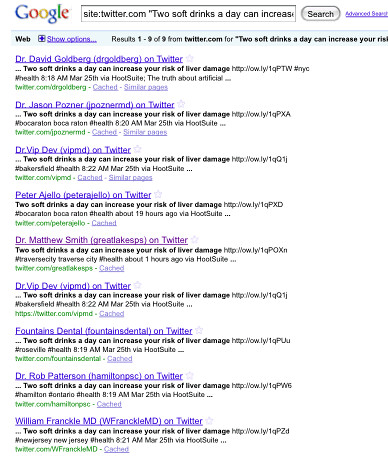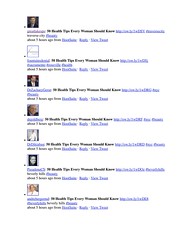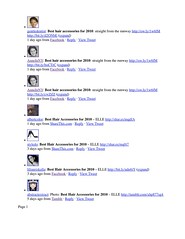Twitter SPAM can get you BANNED!
April 19th, 2010 by
No one likes SPAM! I’m not talking about the canned meat product. I happen to like the stuff myself. It reminds me of camping when I was a kid. What I am talking about is that which clogs our inboxes, dilutes and degrades the integrity and usefulness of … well, pretty much every new form of communication that arises.
In Twitter’s blog post “State of Twitter Spam” they identify
Twitter SPAM as “behaviors that range from insidious to annoying. Posting harmful links to phishing or malware sites, repeatedly posting duplicate tweets, and aggressively following and un-following accounts to attract attention”
Their progressive and aggressive approach to taking down the spammers has been a good fight. I’ve had numerous odd accounts follow me who seems to disappear due to “suspicious behavior” before I even got around to seeing who it was. I don’t know about you but I like that, a lot. It gives me confidence that I won’t be completely inundated with crap – I mean spam.
Some forms of Spam as identified under Twitter’s rules are (as quoted from their forum):
- If you post duplicate content over multiple accounts or multiple duplicate updates on one account;
- If your updates consist mainly of links, and not personal updates;
- If you repeatedly post other users’ Tweets as your own;
- If you have attempted to “sell” followers, particularly through tactics considered aggressive following or follower churn;
Here are a few perfect illustrations of Twitter SPAM “duplicate content over multiple accounts”
and the next one ….
And another….
And another…
If you were to partake in this sort of evil for yourself or on the behalf of clients, the consequence could be an immediate termination of the account or accounts in question.
Obviously, as marketers we need to consider the consequences of what we do for our clients. Ignorance of rules and policies does not exclude anyone from the repercussions of not following or understanding them.
If your client’s account is terminated, you put them at risk. Your efforts to create your Twitter brand awareness and embrace their customer base will alienate those customers and tarnish their name.
In the least, a lot of time and effort is lost. All of your building then has to start from over step one. If you did this in a client’s name, I would say it’s a safe bet their Twitter rebuilding efforts will be with someone else.
As users and viewers we can practice vigilance. If you see this type of behavior, flag it! Let Twitter know. If you’re not sure how, find out here. By all means, don’t follow the links or buy the products. Sometimes it’s hard to spot, but it’s important to be prudent in your clicking and buying.
Remember, every action is a vote. Don’t vote in favor of spam …


… unless it’s the salty, occasionally delicious, when-sitting next-to-a-campfire meat product.
Related reading:
Internet Marketing for Plastic Surgeons – Less Scary than You Think
You Can Buy Brand Love on Twitter?,
The Secret of Small Business Social Media – You Must be Present to Win
(Thanks for the pics! “hegarty_david” and “pabo76“)







Some good advice there Nicholas. We certainly don’t publish to multiple accounts or any of that other nonsense, but the point about only publishing links with no personal updates is worth noting.
Nicholas, thanks for your thoughtful post. However, when Twitter states it is spam to “post to multiple accounts”, isn’t it their intent to avoid allowing one entity to create/own a boatload of accounts in order to “spam” consumers with repeated information as a “work around” having just one account and releasing the same post numerous times in a single day (ie, obvious spamming)? If that were not the intent of that particular “rule”, wouldn’t Twitter discourage reposting among users?
We use Hootsuite for multiple twitter posts for our clients, each of whom is in a separate geographic area with their own unique niche group of followers. Each post gets several “hashtags” specifically for their geographic area and specialty. Though we do post unique tweets about events, etc, this allows them to have a daily beauty tweet to touch base with their clients without paying more money to have 5 unique tweets every week. I checked with Twitter and Hootsuite before utilizing Hootsuite and was told this was an acceptable practice, and I know many marketing firms that use it (Hootsuite). This is not the only method for our clients vis-a-vis their social media, but one among many.
While I agree that it would be “best” if “every” daily tweet were unique, I’d like to hear from others in marketing about the practicality of this. The reason we’re hired is that our clients don’t have time to keep up with regular tweets. You work with the same client type—aesthetic surgeons, dentists and derms—and you know how hard it is to reach most of them. Truth is, they don’t have time to approve a daily tweet meant just to connect with their niche market–been there, tried that. It’s tough enough getting them to approve less-frequent blog posts.
While I appreciate your illustration, I wish you would reconsider posting the identity of clients in this public forum. If there’s something we’re doing wrong, we’re happy to know it and change our tune, but according to those I contacted at Hootsuite and Twitter, our method is accepted by them and does not violate their spam regulations.
We’re not into spam either—including the kind in the can.
Anne Cohen
A Cohen Marketing & Public Relations
New York
Hi Anne Cohen of A Cohen Marketing & Public Relations,
Thanks for taking the time to comment. I’m sure Nick will weigh in as well but I thought I’d share my opinion.
I think there’s a thick line between the social media purists and the way marketers like us use social media. From the purists perspective any kind of “auto-tweeting” is a big no-no.
To be clear, we do it too. And, we even pre-write beauty tips and the like for some of our clients. That said, we do create unique content for each and every tweet and we try to demonstrate engagement in the local and niche communities our clients serve (some aren’t locally focused).
And, everything we tweet on behalf of a client is reviewed by someone in the business to assure it’s not inconsistent with their interests or desires.
I don’t think anyone would argue that pre-tweeting or auto-tweeting aren’t necessarily spam, but when one tweets the same tweet, whether modified with irrelevant local hashtags or not, across multiple accounts with no attribution to the original it could be argued that that crosses the line into what Twitter would call spam.
Clearly, the best use of social media is real-time and interactive but we would agree that’s not always possible.
If your clients are happy with the service you provide and you and they feel it’s a benefit to their followers – who we hope would one day become customers – then by all means keep it up.
I would bet though that if you went back to those folks at Twitter and Hootsuite and showed them the examples above they might have a slightly different perspective. I will try to reach out to see if we can get some clarifying commentary.
Thanks again for your insight Anne Cohen of A Cohen Marketing & Public Relations.
Will
I find Anne’s concept of a daily tweet interesting… seems to fly in the face of the essence of twitter — conversation. Seems like it would feel odd to have a daily call to one’s customers… kind of sounds like an ad.
Yes clients outsource to consultants because the client doesn’t have time to do Twitter right… but the real shame comes when the consultant is guilty of the same foible.
There are no short cuts in Twitter or SocMe in general. It’s about entering into a conversation — albeit a digital one — it’s still a conversation no?
The idea of saying the same thing under different accounts that speak to different audiences for say, announcing a blog post is fine. But after that — talk to me baby… my 02.
@TomMartin
Thanks for the great feedback everyone.
Hi Steve,
Thanks for your comment. I think that the use of personal updates are essential in these forums. I always respond much better to a restaurant tweeting that they are having a rocking night, the customers are in high spirits and if you come and join the party you can take advantage of “insert marketing incentive”. I’m much more likely to go join in than if it was just a marketing message. This is obviously a little more difficult depending on the business in question and of course one would have to be careful not to go too personal or cross any boundaries that might alienate their clientele.
Hi Anne,
I appreciate your comments. Hootsuite is a wonderful tool but like most tools it has capabilities of being used in ways that require self-regulation. There are many Twitter tools out there, and almost all of them can be abused without going outside the regulation set forth by the third party that created the tool. That doesn’t mean it doesn’t cross the boundaries of what is acceptable by Twitter’s policies.
Regarding your question “If that were not the intent of that particular “rule”, wouldn’t Twitter discourage reposting among users?” I have to defer to Will’s comment “there’s a thick line between the social media purists and the way marketers like us use social media.” Twitter is a tool for interaction and communication, and within those bounds, marketing is possible but not at the core of it’s creation or intention. Twitter encourages reposts, hence the retweet feature. It would seem to me they want communication worth repeating to be repeated but with attribution to the creator of the tweet. Give credit where credit is due. For someone to knowingly repost the same message under multiple accounts and not acknowledge the other instances of that tweet is misleading. In my view, that behavior would go directly against what they are trying to avoid. It’s not genuine and attributes to the degradation of the service.
Hi Tom,
I agree. At its heart, it’s all about interaction. This isn’t a captive audience. Consultants need to do that which their clients can’t, and that means- Engage, interact, react. “Talk to me baby”
Nicholas
Thanks to all for weighing in. Isn’t it always one of the most difficult thing, as marketers, to balance the desires of the client for exposure with their desire to pay as little as possible?
While I’m all for finding shortcuts that work, I do have to agree now with Nicholas that this does violate the “spirit” of Twitter specifically and of social media in general, and I think Tom said it also, it’s about interactivity. Our clients are just gonna have to pony up if they want quality interactions.
Anne Cohen
A Cohen Marketing and PR
As a plastic surgeon, I would like to think that I’m creating unique content with my personality shining through. and shouting it out to the internet.
It’s hard to actually come up with a totally unique surgical procedure that only I can do, but it’s pretty easy to write about my take on facelifts or breast augmentation.
With Twitter, I’ve really tried to have followers that are former patients, current patients, or REAL potential patients. My account has it’s share of competitors and weird users, but I have avoided just talking about articles in the news, because I don’t feel it’s that useful or unique. I try to concentrate on unique articles in my blog or website.
I can’t wait to be offered 1,000 Twitter members considering plastic surgery for the low price of $10,000 at the upcoming ASAPS meeting in Washington, DC……
Hi Anne, I’m glad you found the discussion valuable.
Hi Roy, I really like your take on being selective in both followers and messaging. I think that shows a good grasp on adding value to the conversation and speaks well for your brand.
Thanks
Nicholas
Their rule, “If your updates consist mainly of links, and not personal updates” seems a little overmuch, considering that Twitter appears to be replacing RSS/Atom feed readers to large degree.
Also, it’s a bit hard to fathom, considering if a user didn’t want the content of a particular account’s stream, they could merely unsubscribe from it.
I imagine it’s going to be very hard for them to police some of these rules, since the criteria seems pretty subjective.
I do like their rules on unsubbing accounts that post malware links and which copy tweets without giving credit.
[…] Twitter SPAM can get you BANNED! […]